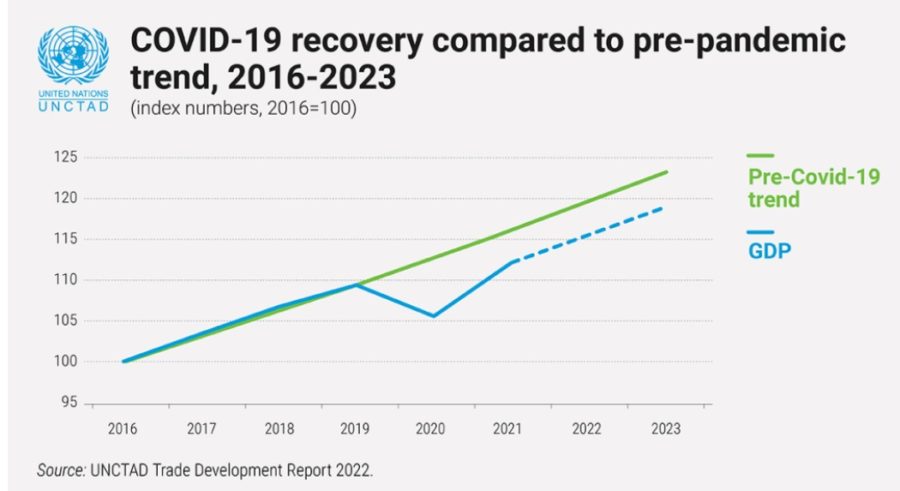Fed rate hikes risking global recession, UN says

The Federal Reserve looks likely to raise its funds rate yet again in November despite a growing chorus for the central bank to stop as the strong dollar and unrelenting inflation inflict harm in the United States and around the world.
A United Nations agency warned that excessive money-tightening is risking a recession that would be deeper than the 2007-2009 crisis.
“The world is headed towards a global recession and prolonged stagnation unless fiscal and monetary policies holding sway in some advanced economies are quickly changed,” according to a report released Monday by the UN Conference on Trade and Development (UNCTAD).
The report said raising rates will contribute to slowing the global economy even further next year, costing a total of $17 trillion in lost productivity. The effect is even more significant on developing and indebted nations, where “excessive monetary tightening could usher in a period of stagnation and economic instability.”
The agency is requesting instead loosening liquidity and assisting developing countries with debt relief. The currencies of 90 developing countries have against the dollar this year, a third of them more than 10%.
Commodity markets
The central problem of volatile commodity prices is not a new one, according to the report, adding that “commodity markets have been in a turbulent state for a decade.”
The authors went on to blame financial markets for manipulating prices.
“Insufficient attention has been paid to the role of speculators and betting frenzies in futures contracts, commodity swaps and exchange traded funds (ETFs),” the agency warned.
UNCTAD Secretary-General Rebeca Grynspan said there is still time to pull back from the brink of recession.
“We have the tools to calm inflation and support all vulnerable groups,” Grynspan said. “This is a matter of policy choices and political will. But the current course of action is hurting the most vulnerable, especially in developing countries and risks tipping the world into a global recession.”
‘Braking too hard’
The agency is joining a chorus of critics who say the Federal Reserve is fighting today’s economic issues with blunt instruments. The problem is not a typical demand-driven inflation but a supply shock, now exacerbated by tighter money policy, according to one of people producing the report.
“The real problem facing policy makers is not an inflation crisis caused by too much money chasing too few goods, but a distributional crisis with too many firms paying too high dividends, too many people struggling from paycheck to paycheck and too many governments surviving from bond payment to bond payment,” said Richard Kozul-Wright, head of the team in charge of the report.
The UN report follows speculation that the Fed is expected to boost its fund rate up yet again from its current 4.50, a stiff increase from its near-zero rate for several years.
Also on Monday, Fed New York President John Williams said even though inflation appears to be cooling in the United States, it is too early to stop raising rates.
“Clearly, inflation is far too high, and persistently high inflation undermines the ability of our economy to perform at its full potential,” Williams said in the text of a speech to be delivered before an audience in Phoenix. “Tighter monetary policy has begun to cool demand and reduce inflationary pressures, but our job is not yet done.”
The economy will slow and unemployment will grow as a consequence of fighting inflation, Williams said, according to Reuters. He expects economic activity to be flat this year and modest next year, with unemployment growing from 3.7% today to 4.5% by the end of next year, Reuters reports.
Alarm bells
Meanwhile, commentators across the spectrum are ringing alarm bells on the Fed’s policy, with CNBC running the headline, “Here’s what has Wall Street on edge as risks rise around the world.”
The article quotes many expert sources concerned about the Fed’s direction, such as quoting Benjamin Dunn, a former hedge fund chief risk officer who now runs consultancy Alpha Theory Advisors.
“The Fed is breaking things,” Dunn said. “There’s really nothing historical you can point to for what’s going on in markets today; we are seeing multiple standard deviation moves in things like the Swedish krona, in Treasurys, in oil, in silver, like every other day. These aren’t healthy moves.”
The New York Times’ Nobel-winning writer Paul Krugman raised the question “Is the Fed braking too hard” recently.
“I’m hearing growing buzz, both from economists and from businesspeople, to the effect that the Federal Reserve — which clearly kept its foot on the gas too long last year — is now braking too hard in compensation. And the risks of an accident are growing,” Krugman wrote with a reference to a Fortune article confirming that the Fed is “oversteering.”
Krugman noted that mortgage rates are at their highest since 2008, and that further rate increases across the board risk bringing the economy back to those bad old days.
“These rate rises will surely cause a major economic slowdown,” Krugman wrote, “quite possibly a recession.”
Steven A. Morelli is a contributing editor for InsuranceNewsNet. He has more than 25 years of experience as a reporter and editor for newspapers and magazines. He was also vice president of communications for an insurance agents’ association. Steve can be reached at [email protected].
© Entire contents copyright 2022 by InsuranceNewsNet. All rights reserved. No part of this article may be reprinted without the expressed written consent from InsuranceNewsNet.
Steven A. Morelli is a contributing editor for InsuranceNewsNet. He has more than 25 years of experience as a reporter and editor for newspapers and magazines. He was also vice president of communications for an insurance agents’ association. Steve can be reached at [email protected].







Making the most of Financial Planning Month
Wisconsin releases enforcement actions for September
Advisor News
- Winona County approves 11% tax levy increase
- Top firms’ 2026 market forecasts every financial advisor should know
- Retirement optimism climbs, but emotion-driven investing threatens growth
- US economy to ride tax cut tailwind but faces risks
- Investor use of online brokerage accounts, new investment techniques rises
More Advisor NewsAnnuity News
- Judge denies new trial for Jeffrey Cutter on Advisors Act violation
- Great-West Life & Annuity Insurance Company Trademark Application for “EMPOWER BENEFIT CONSULTING SERVICES” Filed: Great-West Life & Annuity Insurance Company
- 2025 Top 5 Annuity Stories: Lawsuits, layoffs and Brighthouse sale rumors
- An Application for the Trademark “DYNAMIC RETIREMENT MANAGER” Has Been Filed by Great-West Life & Annuity Insurance Company: Great-West Life & Annuity Insurance Company
- Product understanding will drive the future of insurance
More Annuity NewsHealth/Employee Benefits News
Life Insurance News
- One Bellevue Place changes hands for $90.3M
- To attract Gen Z, insurance must rewrite its story
- Baby On Board
- 2025 Top 5 Life Insurance Stories: IUL takes center stage as lawsuits pile up
- Private placement securities continue to be attractive to insurers
More Life Insurance News